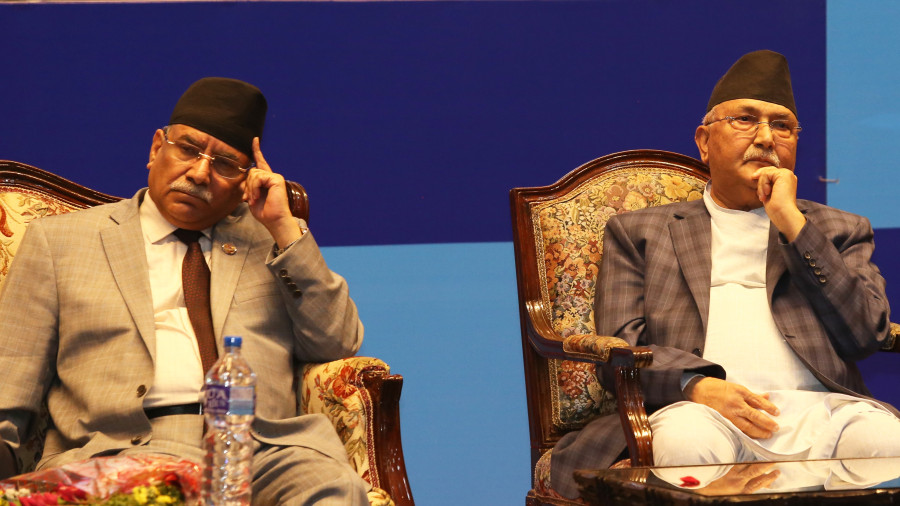Columns
The ruling party feud has far-reaching repercussions
If the meddling and backstabbing go unchecked, democracy and federalism may be at stake.
Achyut Wagle
Last week, the ruling Nepal Communist Party (NCP) appeared to have arrived at an unavoidable split when one of its two chairmen, Pushpa Kamal Dahal, handed over a 20-page-long 'report of indictment' to other chair and prime minister, KP Oli, underlining the latter's comprehensive failure to effectively govern the country and also his deliberately shirking away from the party's Secretariat meetings called to discuss the issue.
But the situation unexpectedly took a dramatic turn, thanks to the Chinese Ambassador Hou Yanqi's marathon meetings with President Bidya Devi Bhandari, Prime Minister Oli and several other top-hats on November 17. The Secretariat meeting the next day saw some thawing of tensions; the leaders agreed to schedule the next meeting 10 days later, on November 28, giving Oli time to respond to Dahal's allegations. Even last July, Hou was considered to have been instrumental for a patchwork compromise between the two warring factions in the ruling party. Regardless, jitters of the impending break-up still envelop the entire party rank and file.
Beyond and above the amusement and some battery to the so-called political analysts provided by the spectre surrounding the tug-of-war in the ruling communist party, the nature of current feud has posed a number of questions. They include the very future of the Nepal Communist Party, the constitutionality of the president's partial role as a saviour to one of the political factions in intra-party wrangling, the long-run effects of the space made available by our own leaders for our powerful neighbours to manoeuvre in Nepal's internal politics, and, most importantly, the implication of all these on the sustainability of the hard-earned democratic system of Nepal.
The unimpressive three-year rule by the NCP, with an almost two-thirds majority in the federal parliament, has clearly dissipated the bullish euphemism about the desirability of majority rule and political stability for socioeconomic betterment of the country. Factionalism and breaches of trust marred the party right since the electoral alliance between the then UML and Maoists which later formed the NCP. Interestingly, almost none of the feud is about the ideological differences of the factions. Instead, most of it is due to the lust for power that the leaders have. The exchange of allegations put together only vindicate that both factions have been involved in extensive financial corruption, nepotism and favouritism, and working to further personal vested interests at the cost of the larger and immediate national interests and priorities.
But even if the leaders, or external forces, somehow managed to technically save the ruling party, will it ever be able to deliver any better governance to the country? Any convincing answer is not in sight. Reasons for such pessimism are many. For example, the NCP lacks an identifying philosophical meta-narrative after it was compelled to effectively relinquish Marxism-Leninism to embrace the parliamentary system. Further, an impartial conclusion of the transitional justice process might put a good number of its current stalwarts in hot water for their crimes against humanity during the Maoist insurgency and the top leadership is already disconnected from the people's needs and expectations. It might sound cynical, but a natural separation may provide better prospects, in place of appalling political torpidity and endless series of gridlocks.
China's vision to become the world's largest economy within the next 15 years and its associated ambition for regional influence has put Nepal, due to its geopolitical location, at the vortex of geostrategic rivalry and machinations. India's series of foreign policy failures during the last seven decades and its misadventures—like repeated economic blockades and exacerbated border disputes—have provided fertile ground for the rise of nationalist politics. The rise of the Nepali communists to the power-saddle naturally provided a great opportunity for the Chinese establishment to meddle in Nepali politics.
The immediate Chinese priority appears to be concentrated in saving the NCP unity, as the break up may lead to its ouster from power. Second, the divided politics in the ruling party has helped it find loyal political bedfellows with aligned strategic interests. For instance, the Dahal faction for long has stalled the ratification of the US-sponsored $500 million Millennium Challenge Corporation (MCC) Compact, which China sees as a counter to its Belt and Road Initiative. Recent efforts by Prime Minister Oli to mend ties with New Delhi may not have gone well with Beijing. The implicit impact of it may be seen on the unwavering determination of Dahal to corner Oli. New Delhi has not found an alternative avenue other than working with Oli. Beijing's current preference, however, could be to see Dahal in power, but it wants to achieve this without breaking the Nepal Communist Party.
Both neighbours, India and China, are set to consolidate their engagements as the Indian Foreign Secretary, Harsh Vardhan Shringla is coming on a two-day official visit on November 26 and 27, which will be followed by a one-day visit by Chinese Defence Minister Wei Fenghe on November 29. The strategic interest of these powerful neighbours may not be an entirely new phenomenon, but Nepal's inability to keep its own house in order to resist their unpalatable interference has perhaps taken this to an alarming height.
All of these developments, from the president’s political role to the NCP’s internal struggles to the open geopolitical meddling, only point to the precarious future of Nepal's federal democracy. What the fighting factions in the communist party have failed to realise is that their irresponsible acts have far deeper and wider repercussions on the country and its chosen system of governance.




 13.12°C Kathmandu
13.12°C Kathmandu















